Resource Allocation in Healthcare: Children vs Elderly - HSH762 Deakin
VerifiedAdded on 2023/06/07
|8
|2536
|165
Essay
AI Summary
This essay addresses the complex ethical dilemma of allocating healthcare resources between children and the elderly, particularly within the context of limited resources in the Australian healthcare system. The paper explores the decision-making levels within the healthcare system and the ethical frameworks that should guide resource allocation, including right-based ethics and utilitarian ethics. It examines the legal perspectives, the context of disease prevalence, and the potential consequences of prioritizing one group over the other. The essay analyzes the arguments for and against allocating more resources to children versus the elderly, considering factors such as potential productive life years, economic viability, and societal contributions. The conclusion highlights the subjective nature of such decisions and emphasizes the lack of an objective framework for resolving these ethical dilemmas. The essay references various sources to support its arguments and provides a nuanced perspective on this critical issue.
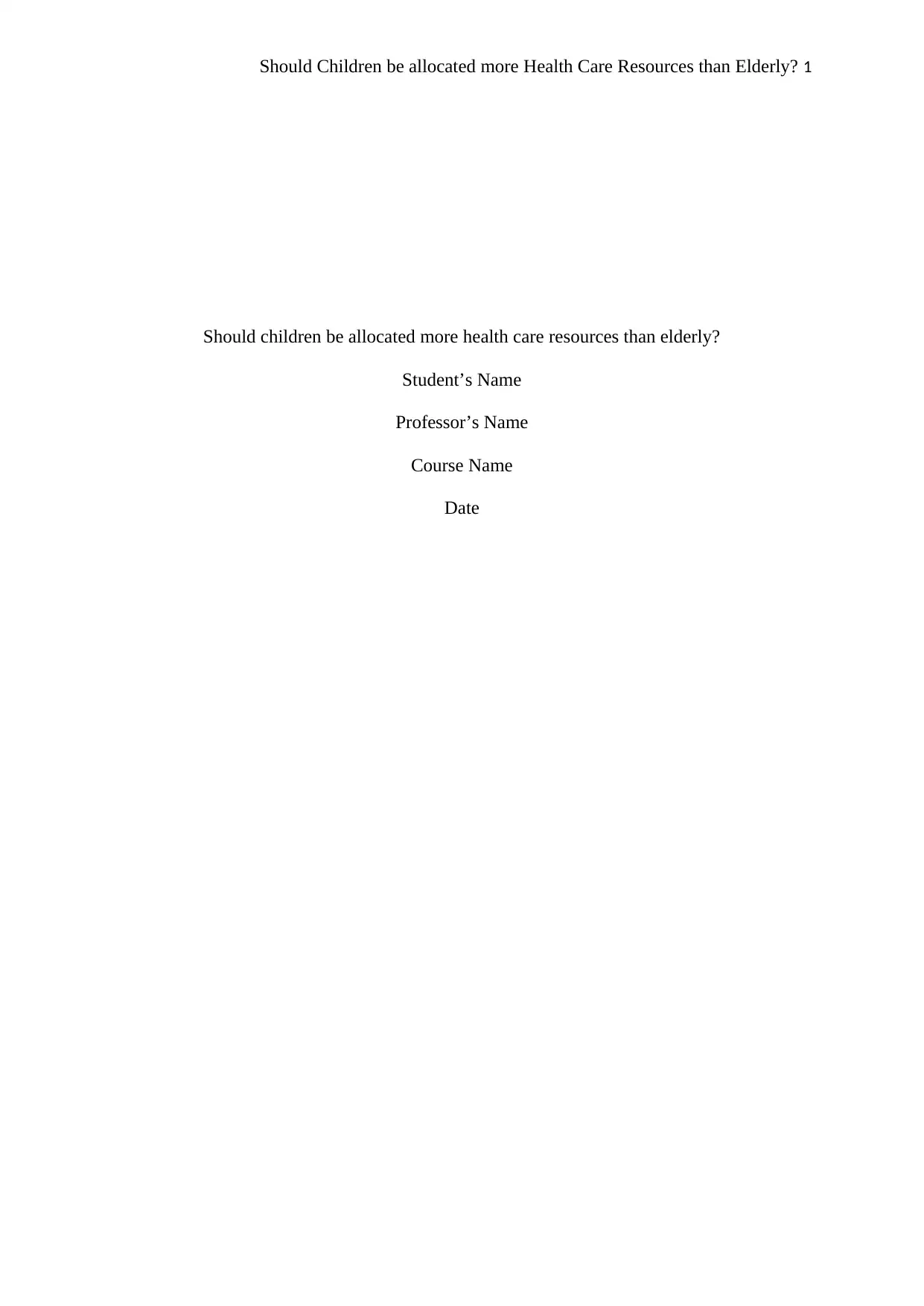
Should Children be allocated more Health Care Resources than Elderly? 1
Should children be allocated more health care resources than elderly?
Student’s Name
Professor’s Name
Course Name
Date
Should children be allocated more health care resources than elderly?
Student’s Name
Professor’s Name
Course Name
Date
Paraphrase This Document
Need a fresh take? Get an instant paraphrase of this document with our AI Paraphraser
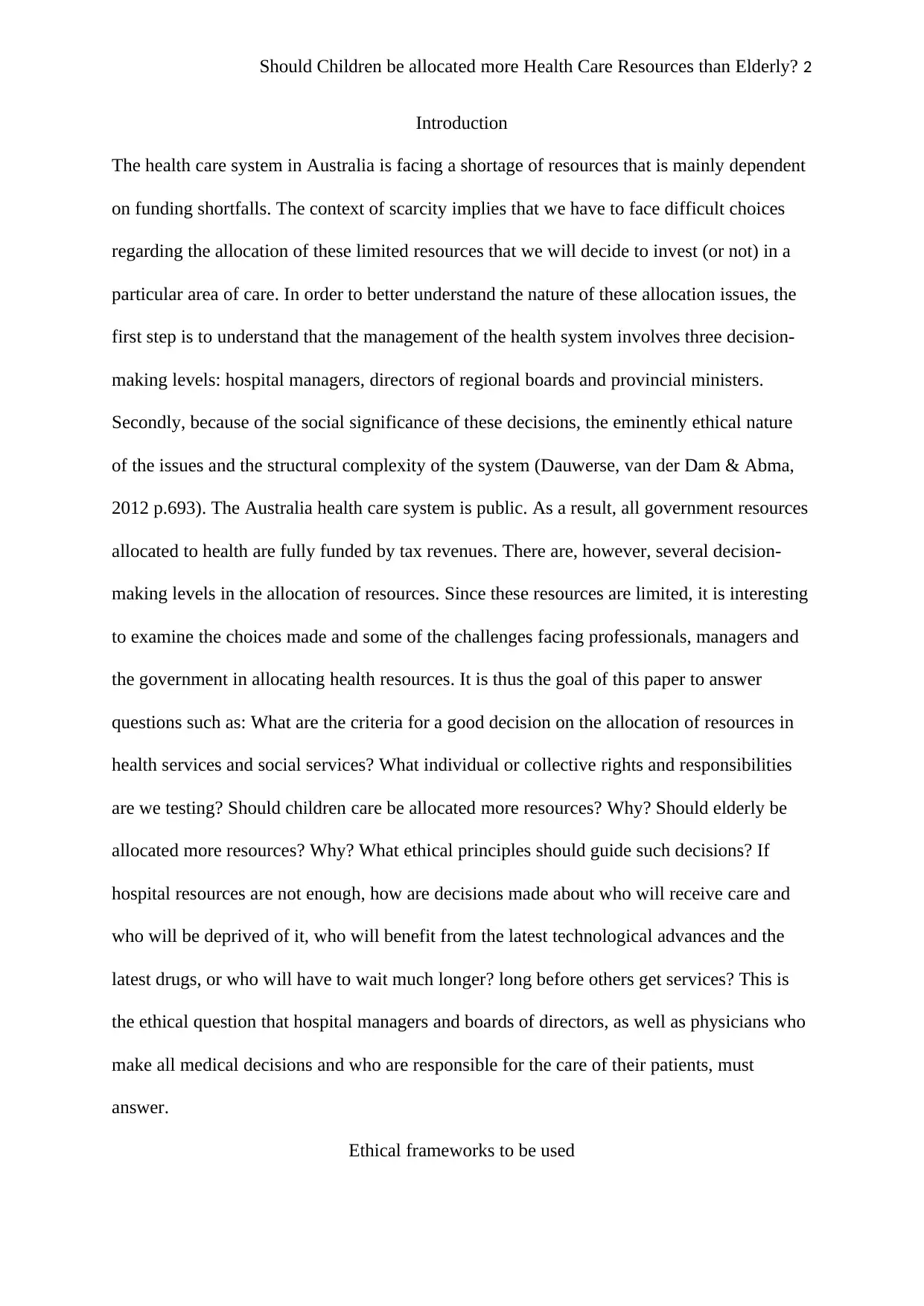
Should Children be allocated more Health Care Resources than Elderly? 2
Introduction
The health care system in Australia is facing a shortage of resources that is mainly dependent
on funding shortfalls. The context of scarcity implies that we have to face difficult choices
regarding the allocation of these limited resources that we will decide to invest (or not) in a
particular area of care. In order to better understand the nature of these allocation issues, the
first step is to understand that the management of the health system involves three decision-
making levels: hospital managers, directors of regional boards and provincial ministers.
Secondly, because of the social significance of these decisions, the eminently ethical nature
of the issues and the structural complexity of the system (Dauwerse, van der Dam & Abma,
2012 p.693). The Australia health care system is public. As a result, all government resources
allocated to health are fully funded by tax revenues. There are, however, several decision-
making levels in the allocation of resources. Since these resources are limited, it is interesting
to examine the choices made and some of the challenges facing professionals, managers and
the government in allocating health resources. It is thus the goal of this paper to answer
questions such as: What are the criteria for a good decision on the allocation of resources in
health services and social services? What individual or collective rights and responsibilities
are we testing? Should children care be allocated more resources? Why? Should elderly be
allocated more resources? Why? What ethical principles should guide such decisions? If
hospital resources are not enough, how are decisions made about who will receive care and
who will be deprived of it, who will benefit from the latest technological advances and the
latest drugs, or who will have to wait much longer? long before others get services? This is
the ethical question that hospital managers and boards of directors, as well as physicians who
make all medical decisions and who are responsible for the care of their patients, must
answer.
Ethical frameworks to be used
Introduction
The health care system in Australia is facing a shortage of resources that is mainly dependent
on funding shortfalls. The context of scarcity implies that we have to face difficult choices
regarding the allocation of these limited resources that we will decide to invest (or not) in a
particular area of care. In order to better understand the nature of these allocation issues, the
first step is to understand that the management of the health system involves three decision-
making levels: hospital managers, directors of regional boards and provincial ministers.
Secondly, because of the social significance of these decisions, the eminently ethical nature
of the issues and the structural complexity of the system (Dauwerse, van der Dam & Abma,
2012 p.693). The Australia health care system is public. As a result, all government resources
allocated to health are fully funded by tax revenues. There are, however, several decision-
making levels in the allocation of resources. Since these resources are limited, it is interesting
to examine the choices made and some of the challenges facing professionals, managers and
the government in allocating health resources. It is thus the goal of this paper to answer
questions such as: What are the criteria for a good decision on the allocation of resources in
health services and social services? What individual or collective rights and responsibilities
are we testing? Should children care be allocated more resources? Why? Should elderly be
allocated more resources? Why? What ethical principles should guide such decisions? If
hospital resources are not enough, how are decisions made about who will receive care and
who will be deprived of it, who will benefit from the latest technological advances and the
latest drugs, or who will have to wait much longer? long before others get services? This is
the ethical question that hospital managers and boards of directors, as well as physicians who
make all medical decisions and who are responsible for the care of their patients, must
answer.
Ethical frameworks to be used
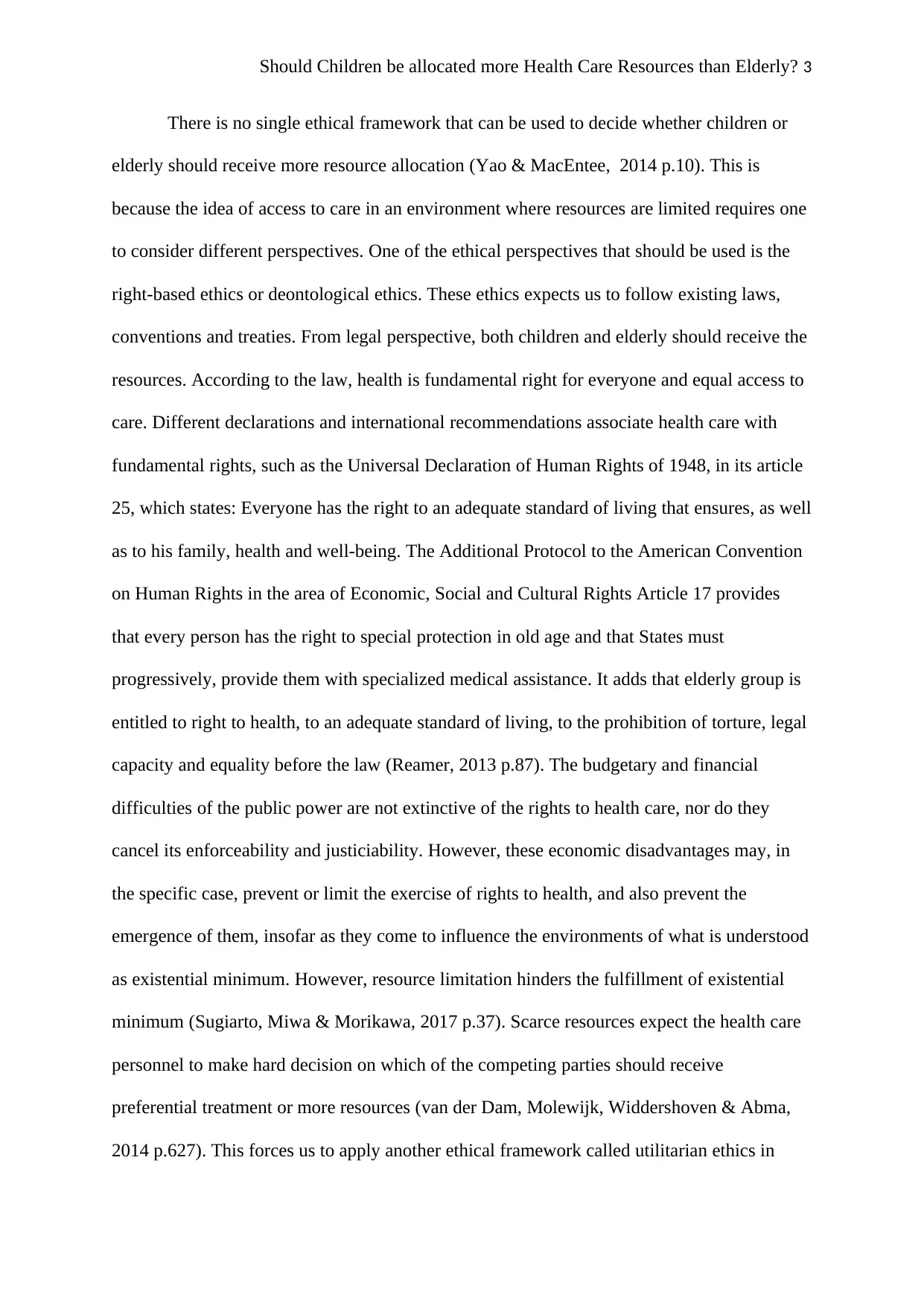
Should Children be allocated more Health Care Resources than Elderly? 3
There is no single ethical framework that can be used to decide whether children or
elderly should receive more resource allocation (Yao & MacEntee, 2014 p.10). This is
because the idea of access to care in an environment where resources are limited requires one
to consider different perspectives. One of the ethical perspectives that should be used is the
right-based ethics or deontological ethics. These ethics expects us to follow existing laws,
conventions and treaties. From legal perspective, both children and elderly should receive the
resources. According to the law, health is fundamental right for everyone and equal access to
care. Different declarations and international recommendations associate health care with
fundamental rights, such as the Universal Declaration of Human Rights of 1948, in its article
25, which states: Everyone has the right to an adequate standard of living that ensures, as well
as to his family, health and well-being. The Additional Protocol to the American Convention
on Human Rights in the area of Economic, Social and Cultural Rights Article 17 provides
that every person has the right to special protection in old age and that States must
progressively, provide them with specialized medical assistance. It adds that elderly group is
entitled to right to health, to an adequate standard of living, to the prohibition of torture, legal
capacity and equality before the law (Reamer, 2013 p.87). The budgetary and financial
difficulties of the public power are not extinctive of the rights to health care, nor do they
cancel its enforceability and justiciability. However, these economic disadvantages may, in
the specific case, prevent or limit the exercise of rights to health, and also prevent the
emergence of them, insofar as they come to influence the environments of what is understood
as existential minimum. However, resource limitation hinders the fulfillment of existential
minimum (Sugiarto, Miwa & Morikawa, 2017 p.37). Scarce resources expect the health care
personnel to make hard decision on which of the competing parties should receive
preferential treatment or more resources (van der Dam, Molewijk, Widdershoven & Abma,
2014 p.627). This forces us to apply another ethical framework called utilitarian ethics in
There is no single ethical framework that can be used to decide whether children or
elderly should receive more resource allocation (Yao & MacEntee, 2014 p.10). This is
because the idea of access to care in an environment where resources are limited requires one
to consider different perspectives. One of the ethical perspectives that should be used is the
right-based ethics or deontological ethics. These ethics expects us to follow existing laws,
conventions and treaties. From legal perspective, both children and elderly should receive the
resources. According to the law, health is fundamental right for everyone and equal access to
care. Different declarations and international recommendations associate health care with
fundamental rights, such as the Universal Declaration of Human Rights of 1948, in its article
25, which states: Everyone has the right to an adequate standard of living that ensures, as well
as to his family, health and well-being. The Additional Protocol to the American Convention
on Human Rights in the area of Economic, Social and Cultural Rights Article 17 provides
that every person has the right to special protection in old age and that States must
progressively, provide them with specialized medical assistance. It adds that elderly group is
entitled to right to health, to an adequate standard of living, to the prohibition of torture, legal
capacity and equality before the law (Reamer, 2013 p.87). The budgetary and financial
difficulties of the public power are not extinctive of the rights to health care, nor do they
cancel its enforceability and justiciability. However, these economic disadvantages may, in
the specific case, prevent or limit the exercise of rights to health, and also prevent the
emergence of them, insofar as they come to influence the environments of what is understood
as existential minimum. However, resource limitation hinders the fulfillment of existential
minimum (Sugiarto, Miwa & Morikawa, 2017 p.37). Scarce resources expect the health care
personnel to make hard decision on which of the competing parties should receive
preferential treatment or more resources (van der Dam, Molewijk, Widdershoven & Abma,
2014 p.627). This forces us to apply another ethical framework called utilitarian ethics in
⊘ This is a preview!⊘
Do you want full access?
Subscribe today to unlock all pages.

Trusted by 1+ million students worldwide
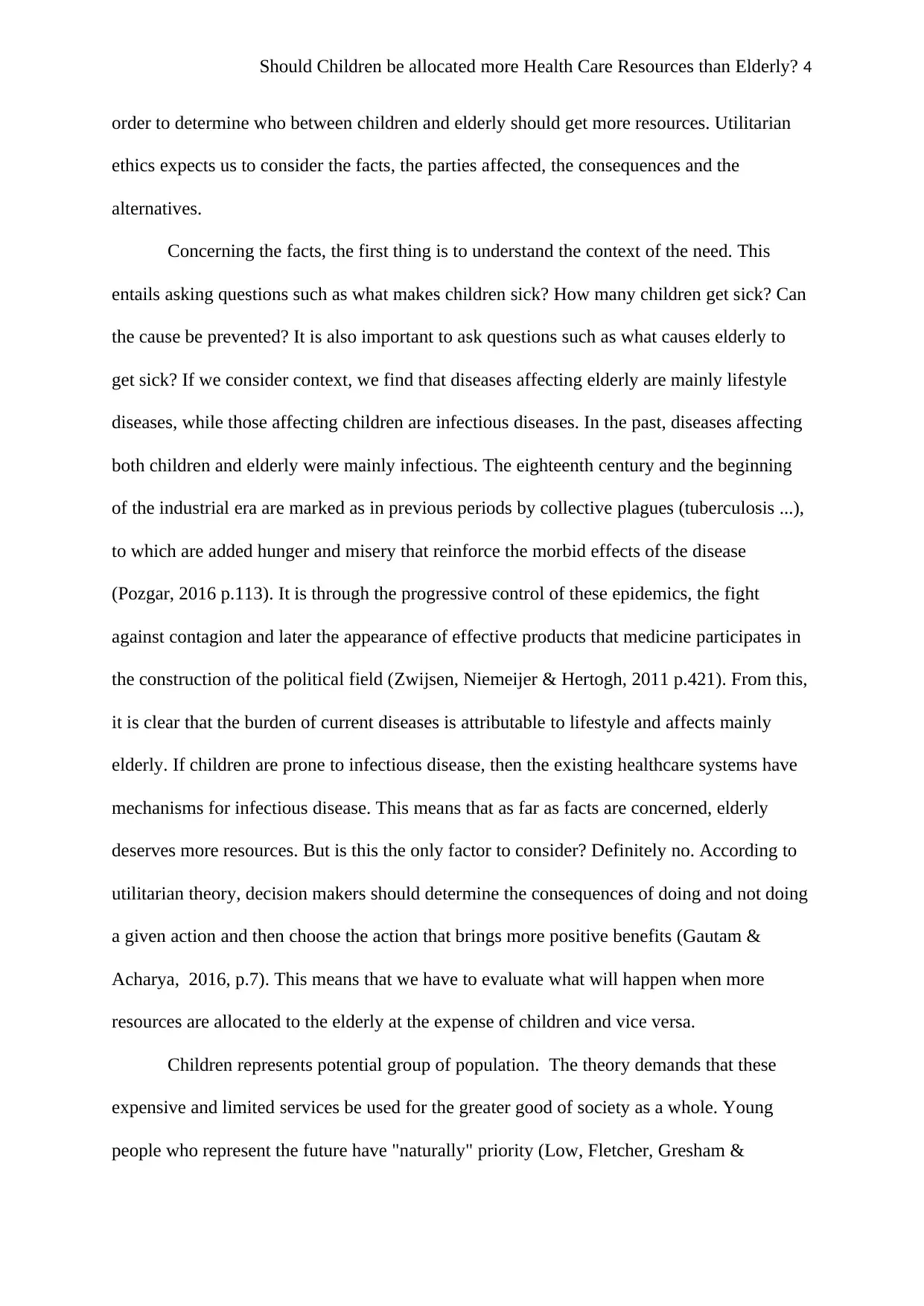
Should Children be allocated more Health Care Resources than Elderly? 4
order to determine who between children and elderly should get more resources. Utilitarian
ethics expects us to consider the facts, the parties affected, the consequences and the
alternatives.
Concerning the facts, the first thing is to understand the context of the need. This
entails asking questions such as what makes children sick? How many children get sick? Can
the cause be prevented? It is also important to ask questions such as what causes elderly to
get sick? If we consider context, we find that diseases affecting elderly are mainly lifestyle
diseases, while those affecting children are infectious diseases. In the past, diseases affecting
both children and elderly were mainly infectious. The eighteenth century and the beginning
of the industrial era are marked as in previous periods by collective plagues (tuberculosis ...),
to which are added hunger and misery that reinforce the morbid effects of the disease
(Pozgar, 2016 p.113). It is through the progressive control of these epidemics, the fight
against contagion and later the appearance of effective products that medicine participates in
the construction of the political field (Zwijsen, Niemeijer & Hertogh, 2011 p.421). From this,
it is clear that the burden of current diseases is attributable to lifestyle and affects mainly
elderly. If children are prone to infectious disease, then the existing healthcare systems have
mechanisms for infectious disease. This means that as far as facts are concerned, elderly
deserves more resources. But is this the only factor to consider? Definitely no. According to
utilitarian theory, decision makers should determine the consequences of doing and not doing
a given action and then choose the action that brings more positive benefits (Gautam &
Acharya, 2016, p.7). This means that we have to evaluate what will happen when more
resources are allocated to the elderly at the expense of children and vice versa.
Children represents potential group of population. The theory demands that these
expensive and limited services be used for the greater good of society as a whole. Young
people who represent the future have "naturally" priority (Low, Fletcher, Gresham &
order to determine who between children and elderly should get more resources. Utilitarian
ethics expects us to consider the facts, the parties affected, the consequences and the
alternatives.
Concerning the facts, the first thing is to understand the context of the need. This
entails asking questions such as what makes children sick? How many children get sick? Can
the cause be prevented? It is also important to ask questions such as what causes elderly to
get sick? If we consider context, we find that diseases affecting elderly are mainly lifestyle
diseases, while those affecting children are infectious diseases. In the past, diseases affecting
both children and elderly were mainly infectious. The eighteenth century and the beginning
of the industrial era are marked as in previous periods by collective plagues (tuberculosis ...),
to which are added hunger and misery that reinforce the morbid effects of the disease
(Pozgar, 2016 p.113). It is through the progressive control of these epidemics, the fight
against contagion and later the appearance of effective products that medicine participates in
the construction of the political field (Zwijsen, Niemeijer & Hertogh, 2011 p.421). From this,
it is clear that the burden of current diseases is attributable to lifestyle and affects mainly
elderly. If children are prone to infectious disease, then the existing healthcare systems have
mechanisms for infectious disease. This means that as far as facts are concerned, elderly
deserves more resources. But is this the only factor to consider? Definitely no. According to
utilitarian theory, decision makers should determine the consequences of doing and not doing
a given action and then choose the action that brings more positive benefits (Gautam &
Acharya, 2016, p.7). This means that we have to evaluate what will happen when more
resources are allocated to the elderly at the expense of children and vice versa.
Children represents potential group of population. The theory demands that these
expensive and limited services be used for the greater good of society as a whole. Young
people who represent the future have "naturally" priority (Low, Fletcher, Gresham &
Paraphrase This Document
Need a fresh take? Get an instant paraphrase of this document with our AI Paraphraser
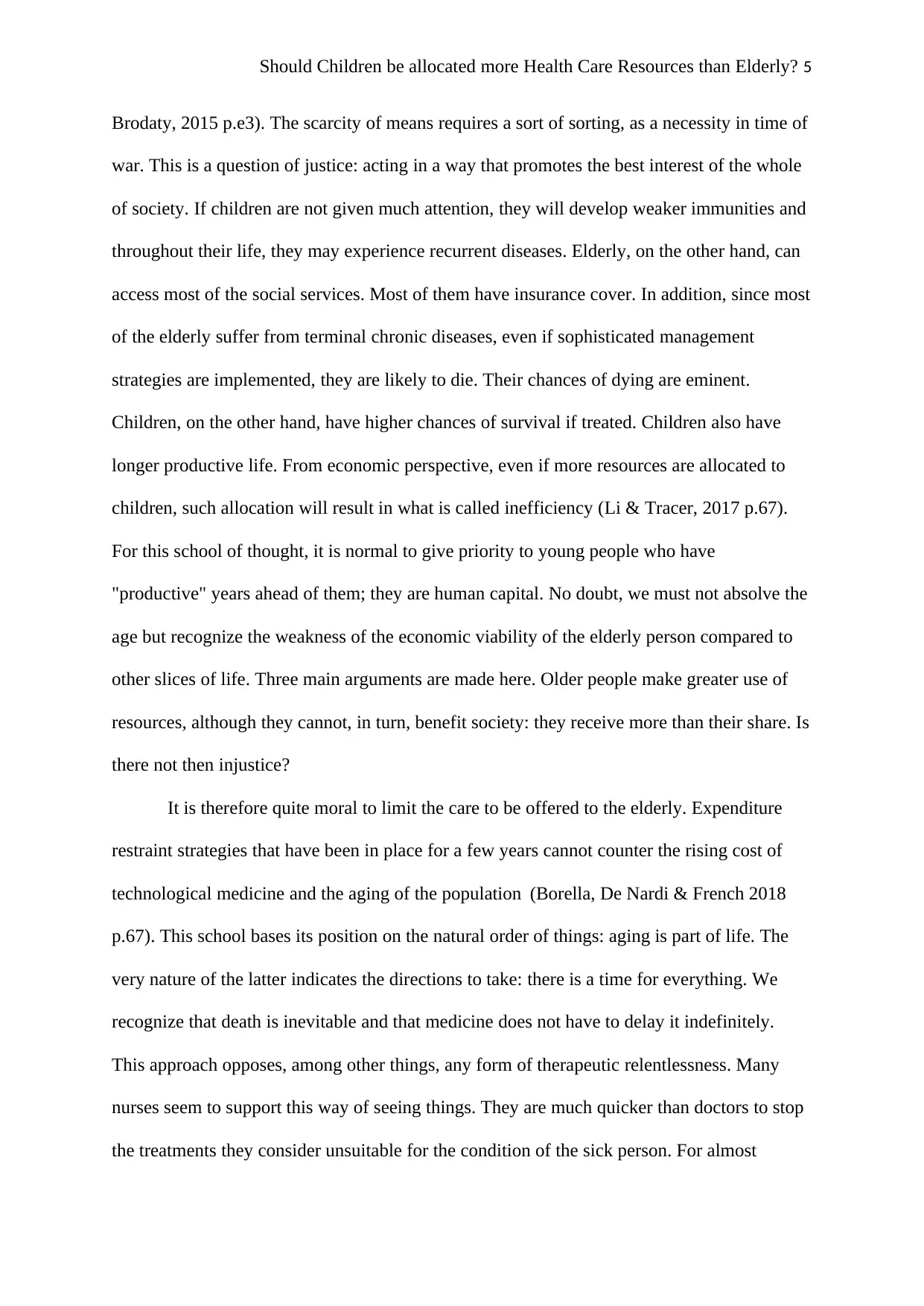
Should Children be allocated more Health Care Resources than Elderly? 5
Brodaty, 2015 p.e3). The scarcity of means requires a sort of sorting, as a necessity in time of
war. This is a question of justice: acting in a way that promotes the best interest of the whole
of society. If children are not given much attention, they will develop weaker immunities and
throughout their life, they may experience recurrent diseases. Elderly, on the other hand, can
access most of the social services. Most of them have insurance cover. In addition, since most
of the elderly suffer from terminal chronic diseases, even if sophisticated management
strategies are implemented, they are likely to die. Their chances of dying are eminent.
Children, on the other hand, have higher chances of survival if treated. Children also have
longer productive life. From economic perspective, even if more resources are allocated to
children, such allocation will result in what is called inefficiency (Li & Tracer, 2017 p.67).
For this school of thought, it is normal to give priority to young people who have
"productive" years ahead of them; they are human capital. No doubt, we must not absolve the
age but recognize the weakness of the economic viability of the elderly person compared to
other slices of life. Three main arguments are made here. Older people make greater use of
resources, although they cannot, in turn, benefit society: they receive more than their share. Is
there not then injustice?
It is therefore quite moral to limit the care to be offered to the elderly. Expenditure
restraint strategies that have been in place for a few years cannot counter the rising cost of
technological medicine and the aging of the population (Borella, De Nardi & French 2018
p.67). This school bases its position on the natural order of things: aging is part of life. The
very nature of the latter indicates the directions to take: there is a time for everything. We
recognize that death is inevitable and that medicine does not have to delay it indefinitely.
This approach opposes, among other things, any form of therapeutic relentlessness. Many
nurses seem to support this way of seeing things. They are much quicker than doctors to stop
the treatments they consider unsuitable for the condition of the sick person. For almost
Brodaty, 2015 p.e3). The scarcity of means requires a sort of sorting, as a necessity in time of
war. This is a question of justice: acting in a way that promotes the best interest of the whole
of society. If children are not given much attention, they will develop weaker immunities and
throughout their life, they may experience recurrent diseases. Elderly, on the other hand, can
access most of the social services. Most of them have insurance cover. In addition, since most
of the elderly suffer from terminal chronic diseases, even if sophisticated management
strategies are implemented, they are likely to die. Their chances of dying are eminent.
Children, on the other hand, have higher chances of survival if treated. Children also have
longer productive life. From economic perspective, even if more resources are allocated to
children, such allocation will result in what is called inefficiency (Li & Tracer, 2017 p.67).
For this school of thought, it is normal to give priority to young people who have
"productive" years ahead of them; they are human capital. No doubt, we must not absolve the
age but recognize the weakness of the economic viability of the elderly person compared to
other slices of life. Three main arguments are made here. Older people make greater use of
resources, although they cannot, in turn, benefit society: they receive more than their share. Is
there not then injustice?
It is therefore quite moral to limit the care to be offered to the elderly. Expenditure
restraint strategies that have been in place for a few years cannot counter the rising cost of
technological medicine and the aging of the population (Borella, De Nardi & French 2018
p.67). This school bases its position on the natural order of things: aging is part of life. The
very nature of the latter indicates the directions to take: there is a time for everything. We
recognize that death is inevitable and that medicine does not have to delay it indefinitely.
This approach opposes, among other things, any form of therapeutic relentlessness. Many
nurses seem to support this way of seeing things. They are much quicker than doctors to stop
the treatments they consider unsuitable for the condition of the sick person. For almost
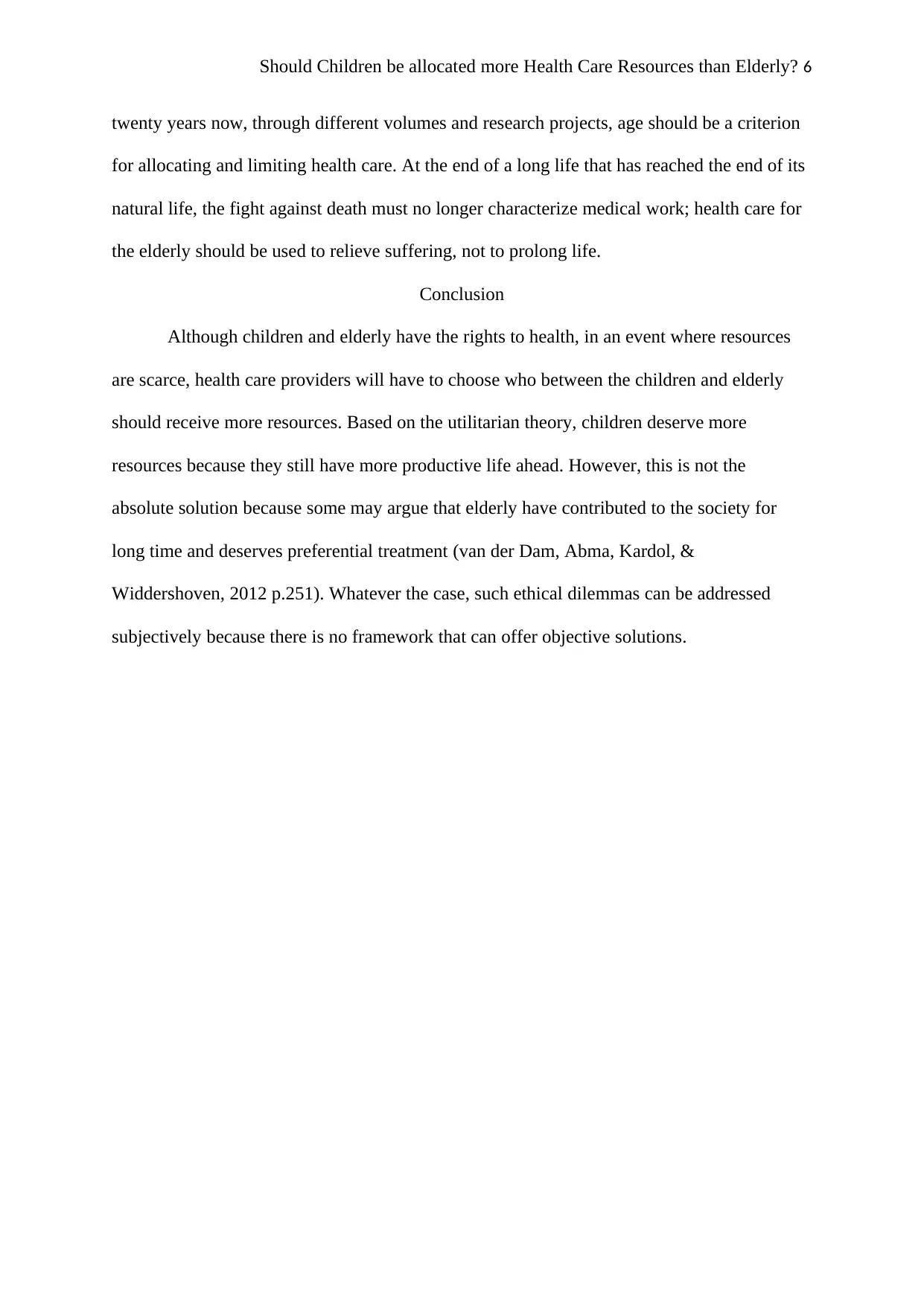
Should Children be allocated more Health Care Resources than Elderly? 6
twenty years now, through different volumes and research projects, age should be a criterion
for allocating and limiting health care. At the end of a long life that has reached the end of its
natural life, the fight against death must no longer characterize medical work; health care for
the elderly should be used to relieve suffering, not to prolong life.
Conclusion
Although children and elderly have the rights to health, in an event where resources
are scarce, health care providers will have to choose who between the children and elderly
should receive more resources. Based on the utilitarian theory, children deserve more
resources because they still have more productive life ahead. However, this is not the
absolute solution because some may argue that elderly have contributed to the society for
long time and deserves preferential treatment (van der Dam, Abma, Kardol, &
Widdershoven, 2012 p.251). Whatever the case, such ethical dilemmas can be addressed
subjectively because there is no framework that can offer objective solutions.
twenty years now, through different volumes and research projects, age should be a criterion
for allocating and limiting health care. At the end of a long life that has reached the end of its
natural life, the fight against death must no longer characterize medical work; health care for
the elderly should be used to relieve suffering, not to prolong life.
Conclusion
Although children and elderly have the rights to health, in an event where resources
are scarce, health care providers will have to choose who between the children and elderly
should receive more resources. Based on the utilitarian theory, children deserve more
resources because they still have more productive life ahead. However, this is not the
absolute solution because some may argue that elderly have contributed to the society for
long time and deserves preferential treatment (van der Dam, Abma, Kardol, &
Widdershoven, 2012 p.251). Whatever the case, such ethical dilemmas can be addressed
subjectively because there is no framework that can offer objective solutions.
⊘ This is a preview!⊘
Do you want full access?
Subscribe today to unlock all pages.

Trusted by 1+ million students worldwide
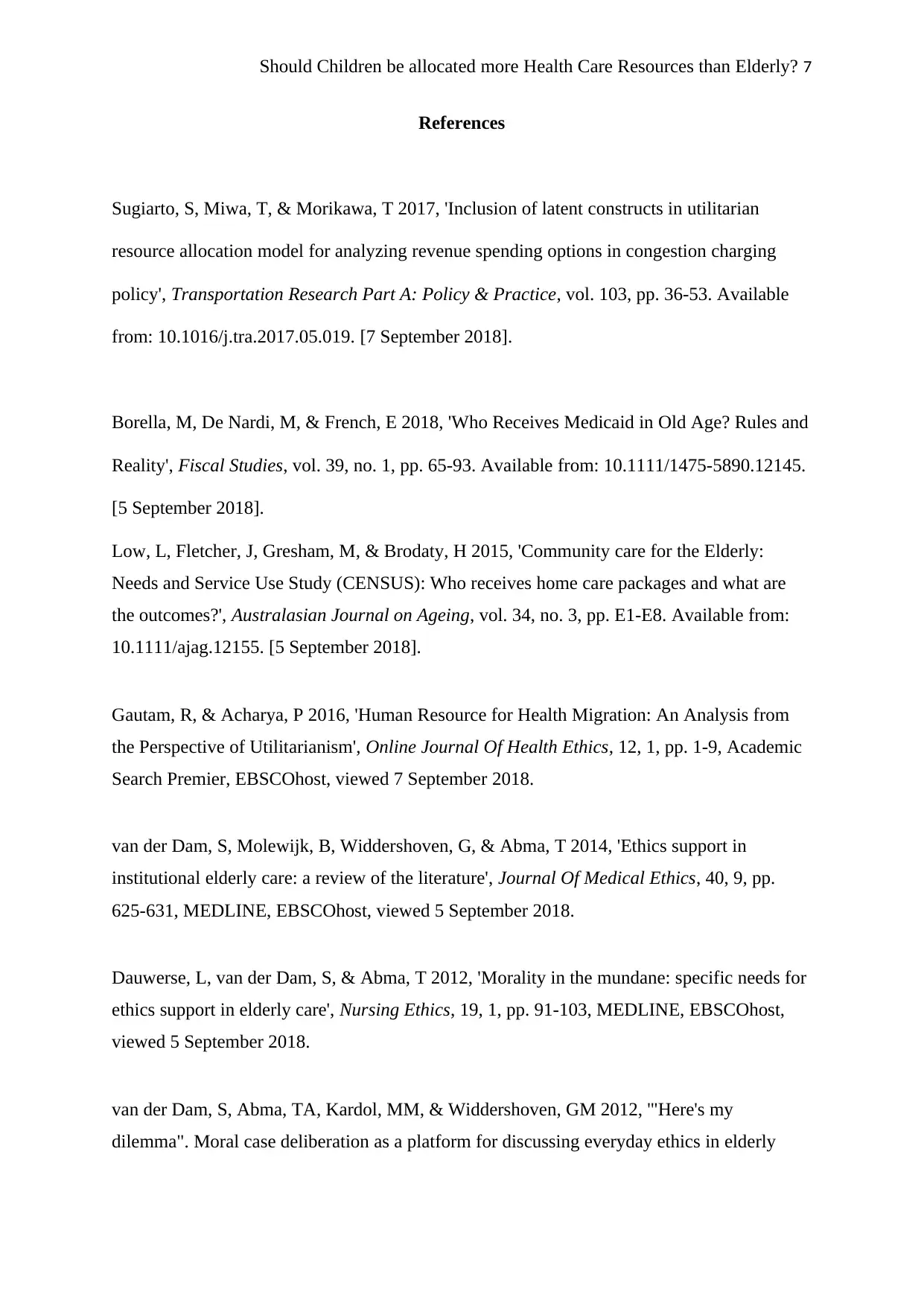
Should Children be allocated more Health Care Resources than Elderly? 7
References
Sugiarto, S, Miwa, T, & Morikawa, T 2017, 'Inclusion of latent constructs in utilitarian
resource allocation model for analyzing revenue spending options in congestion charging
policy', Transportation Research Part A: Policy & Practice, vol. 103, pp. 36-53. Available
from: 10.1016/j.tra.2017.05.019. [7 September 2018].
Borella, M, De Nardi, M, & French, E 2018, 'Who Receives Medicaid in Old Age? Rules and
Reality', Fiscal Studies, vol. 39, no. 1, pp. 65-93. Available from: 10.1111/1475-5890.12145.
[5 September 2018].
Low, L, Fletcher, J, Gresham, M, & Brodaty, H 2015, 'Community care for the Elderly:
Needs and Service Use Study (CENSUS): Who receives home care packages and what are
the outcomes?', Australasian Journal on Ageing, vol. 34, no. 3, pp. E1-E8. Available from:
10.1111/ajag.12155. [5 September 2018].
Gautam, R, & Acharya, P 2016, 'Human Resource for Health Migration: An Analysis from
the Perspective of Utilitarianism', Online Journal Of Health Ethics, 12, 1, pp. 1-9, Academic
Search Premier, EBSCOhost, viewed 7 September 2018.
van der Dam, S, Molewijk, B, Widdershoven, G, & Abma, T 2014, 'Ethics support in
institutional elderly care: a review of the literature', Journal Of Medical Ethics, 40, 9, pp.
625-631, MEDLINE, EBSCOhost, viewed 5 September 2018.
Dauwerse, L, van der Dam, S, & Abma, T 2012, 'Morality in the mundane: specific needs for
ethics support in elderly care', Nursing Ethics, 19, 1, pp. 91-103, MEDLINE, EBSCOhost,
viewed 5 September 2018.
van der Dam, S, Abma, TA, Kardol, MM, & Widdershoven, GM 2012, '"Here's my
dilemma". Moral case deliberation as a platform for discussing everyday ethics in elderly
References
Sugiarto, S, Miwa, T, & Morikawa, T 2017, 'Inclusion of latent constructs in utilitarian
resource allocation model for analyzing revenue spending options in congestion charging
policy', Transportation Research Part A: Policy & Practice, vol. 103, pp. 36-53. Available
from: 10.1016/j.tra.2017.05.019. [7 September 2018].
Borella, M, De Nardi, M, & French, E 2018, 'Who Receives Medicaid in Old Age? Rules and
Reality', Fiscal Studies, vol. 39, no. 1, pp. 65-93. Available from: 10.1111/1475-5890.12145.
[5 September 2018].
Low, L, Fletcher, J, Gresham, M, & Brodaty, H 2015, 'Community care for the Elderly:
Needs and Service Use Study (CENSUS): Who receives home care packages and what are
the outcomes?', Australasian Journal on Ageing, vol. 34, no. 3, pp. E1-E8. Available from:
10.1111/ajag.12155. [5 September 2018].
Gautam, R, & Acharya, P 2016, 'Human Resource for Health Migration: An Analysis from
the Perspective of Utilitarianism', Online Journal Of Health Ethics, 12, 1, pp. 1-9, Academic
Search Premier, EBSCOhost, viewed 7 September 2018.
van der Dam, S, Molewijk, B, Widdershoven, G, & Abma, T 2014, 'Ethics support in
institutional elderly care: a review of the literature', Journal Of Medical Ethics, 40, 9, pp.
625-631, MEDLINE, EBSCOhost, viewed 5 September 2018.
Dauwerse, L, van der Dam, S, & Abma, T 2012, 'Morality in the mundane: specific needs for
ethics support in elderly care', Nursing Ethics, 19, 1, pp. 91-103, MEDLINE, EBSCOhost,
viewed 5 September 2018.
van der Dam, S, Abma, TA, Kardol, MM, & Widdershoven, GM 2012, '"Here's my
dilemma". Moral case deliberation as a platform for discussing everyday ethics in elderly
Paraphrase This Document
Need a fresh take? Get an instant paraphrase of this document with our AI Paraphraser
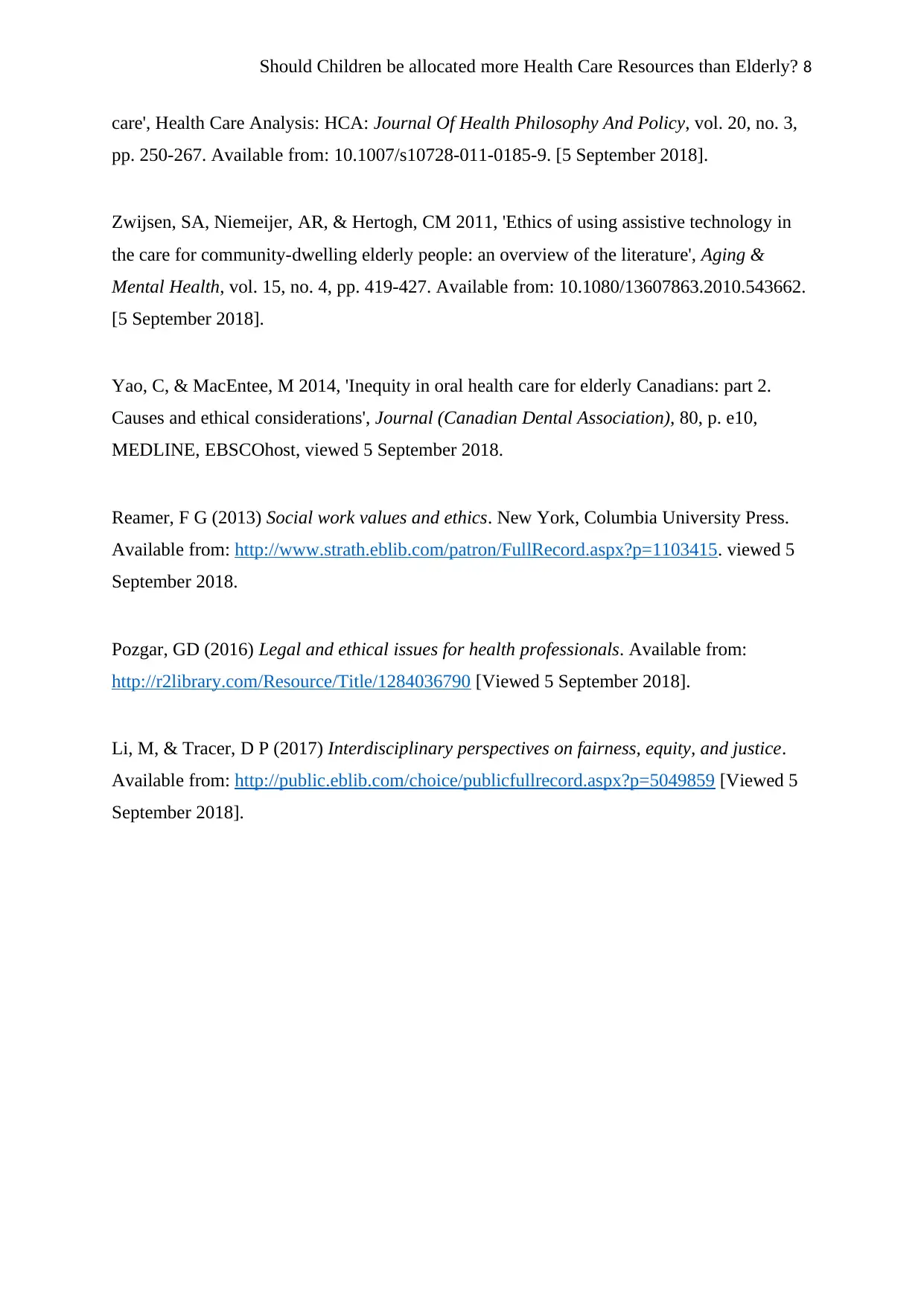
Should Children be allocated more Health Care Resources than Elderly? 8
care', Health Care Analysis: HCA: Journal Of Health Philosophy And Policy, vol. 20, no. 3,
pp. 250-267. Available from: 10.1007/s10728-011-0185-9. [5 September 2018].
Zwijsen, SA, Niemeijer, AR, & Hertogh, CM 2011, 'Ethics of using assistive technology in
the care for community-dwelling elderly people: an overview of the literature', Aging &
Mental Health, vol. 15, no. 4, pp. 419-427. Available from: 10.1080/13607863.2010.543662.
[5 September 2018].
Yao, C, & MacEntee, M 2014, 'Inequity in oral health care for elderly Canadians: part 2.
Causes and ethical considerations', Journal (Canadian Dental Association), 80, p. e10,
MEDLINE, EBSCOhost, viewed 5 September 2018.
Reamer, F G (2013) Social work values and ethics. New York, Columbia University Press.
Available from: http://www.strath.eblib.com/patron/FullRecord.aspx?p=1103415. viewed 5
September 2018.
Pozgar, GD (2016) Legal and ethical issues for health professionals. Available from:
http://r2library.com/Resource/Title/1284036790 [Viewed 5 September 2018].
Li, M, & Tracer, D P (2017) Interdisciplinary perspectives on fairness, equity, and justice.
Available from: http://public.eblib.com/choice/publicfullrecord.aspx?p=5049859 [Viewed 5
September 2018].
care', Health Care Analysis: HCA: Journal Of Health Philosophy And Policy, vol. 20, no. 3,
pp. 250-267. Available from: 10.1007/s10728-011-0185-9. [5 September 2018].
Zwijsen, SA, Niemeijer, AR, & Hertogh, CM 2011, 'Ethics of using assistive technology in
the care for community-dwelling elderly people: an overview of the literature', Aging &
Mental Health, vol. 15, no. 4, pp. 419-427. Available from: 10.1080/13607863.2010.543662.
[5 September 2018].
Yao, C, & MacEntee, M 2014, 'Inequity in oral health care for elderly Canadians: part 2.
Causes and ethical considerations', Journal (Canadian Dental Association), 80, p. e10,
MEDLINE, EBSCOhost, viewed 5 September 2018.
Reamer, F G (2013) Social work values and ethics. New York, Columbia University Press.
Available from: http://www.strath.eblib.com/patron/FullRecord.aspx?p=1103415. viewed 5
September 2018.
Pozgar, GD (2016) Legal and ethical issues for health professionals. Available from:
http://r2library.com/Resource/Title/1284036790 [Viewed 5 September 2018].
Li, M, & Tracer, D P (2017) Interdisciplinary perspectives on fairness, equity, and justice.
Available from: http://public.eblib.com/choice/publicfullrecord.aspx?p=5049859 [Viewed 5
September 2018].
1 out of 8
Related Documents
Your All-in-One AI-Powered Toolkit for Academic Success.
+13062052269
info@desklib.com
Available 24*7 on WhatsApp / Email
![[object Object]](/_next/static/media/star-bottom.7253800d.svg)
Unlock your academic potential
Copyright © 2020–2026 A2Z Services. All Rights Reserved. Developed and managed by ZUCOL.





